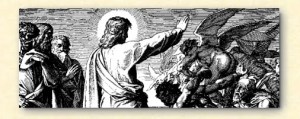Now he was casting out a demon that was mute. When the demon had gone out, the mute man spoke, and the people marveled. But some of them said, “He casts out demons by Beezebul, the Prince of Demons.” Luke 11:14015
Most of the demons Jesus has encountered have been obnoxiously talky, but this one is mute. Not only that, but it has bounds its host with muteness, so neither of them can hail Jesus as the Son of the Blessed One or beg him to go away. So it was a quiet exorcism, as these things go, but the observers are duly amazed. But there’s always a skeptic in the crowd—this time not identified as scribes or Pharisees, so they may just have been run-of-the-mill village atheists. Wherever these observers are coming from, their observation is profoundly stupid: “Well, suppose he’s in league with the demons? Ever thought of that? He could be getting his power from Beelzebul!”
Logic-choppers usually forget there are real issues at stake. And conspiracy theorists get so lost in their thickets of conjecture they lose sight of good sense altogether. Jesus is following the convoluted unreason in their heads and in their whispered conversation and knows it for what it is: not rational but rationalizing. It doesn’t deserve a response (in my opinion), but he responds anyway. Look, people:
Satan is not a myth or an abstract concept—he’s the enemy. Possession isn’t a trick or a parlor game to him—it’s a battle tactic. He’s in this to win. But so am I.
A house, a family, a kingdom divided against itself cannot stand–correct? Now, think: if a commander divides his troops and orders them to fight each other, how long will he last? Let’s rule out that option, shall we? And if we do, what’s left?
The kingdom of God has come upon you.
God’s counteraction has rushed upon this world and its uneasy, illegitimate ruler (Satan) and threatens to unseat him. The invading kingdom is rattling the bars and picking the lock, and Satan—Beelzebub—looks a great deal less masterful than he did. He clutches his most cherished weapon—death—upon his throne of human skulls, and waits for his opportunity to use it. This is reality, people: The kingdom is upon you.
But—
Perhaps he turns to the formerly-possessed man, whose pent-up words are pouring out to his wife and children and neighbors. Feeling that gaze, the man falls silent.
“When the unclean spirit has gone out of a person, it passes through waterless places seeking rest, and finding none it says, ‘I will return to my house from which I came’ . . . The demons are defeated, but not destroyed. It’s still around, that spirit who once dominated you, who squatted in your mind and held your tongue. Do not suppose your soul is your own. If the spirit of muteness is banished, you are subject to a spirit of excess. If by God’s grace you have overcome addiction, you may fall victim to pride. A house is made to be occupied; you can’t clean it up and keep it for a showplace. Your locks and deadbolts are nothing to the spirit world; if God does not reign in your heart, Satan will. Whether you recognize him, or not.
For the original post in this series, go here.
Next>


